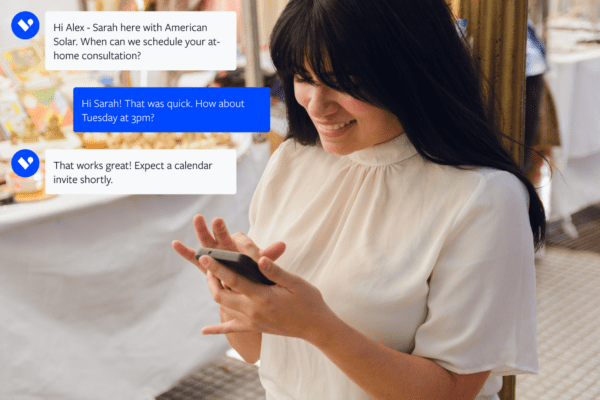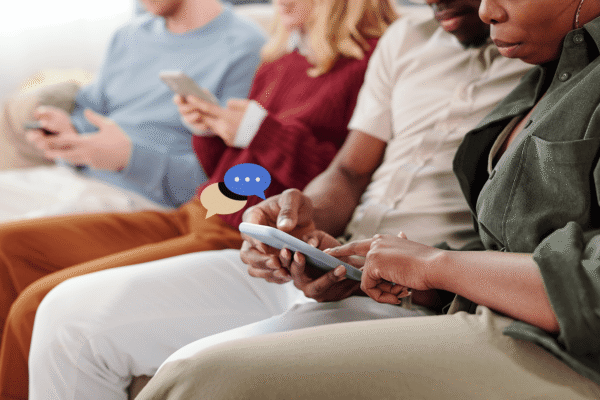How Lead Generation is Threatened in 2024 and Beyond
The New FCC Ruling, Data Privacy, and Third-Party Data
Lead generation is changing this year, and this change is reflected in a new Federal Communications Commission (FCC) ruling as well as Google’s set removal of third-party cookies.
As third-party data strategies have become widespread—perhaps overused—contact data is being bought and sold at a rate upsetting to both the modern consumer and the FCC.
Concerns around data privacy are mounting, with 86% of Americans reporting that they’re more concerned about their privacy and data security than the state of the economy.
With growing data privacy concerns, incoming browser updates, and the impending FCC ruling, businesses must implement new strategies for lead generation, or set themselves up for a huge disadvantage next year.
Companies must understand the meaning of these changes to lead generation, and what they can do to succeed.
The New FCC Ruling
The Federal Communications Commission (FCC) is the governing body for communications in the United States. They are responsible for creating and enforcing rules such as the Telephone Consumer Protection Act (TCPA).
At the end of 2023, the FCC released a new ruling addressing two things:
- The “lead generator loophole”
- Robotexting and robocalling
The rule will go into effect on January 27th, 2025*, as the FCC gave companies a period of time to adjust for the new regulations.
*UPDATE: On January 24th, 2025, the FCC released an order postponing the date that this ruling will go into effect. With this order, the ruling may not go into effect until January 2026 (or sooner). Following a decision from the Eleventh Circuit, the Commission may also publish a Public Notice specifying a sooner date, in which case that sooner date would apply.
The Lead Generation Loophole
The “lead generator loophole” refers to the method through which lead generators would sell contacts to a significant number of companies or partners after the customer filled out a single consent form.

Here is a hypothetical example of the loophole in action:
Someone goes onto a comparison shopping website and fills out a form requesting to learn more about a specific product or service.
From there, the website goes on to sell this person’s contact information to, for example, twenty different companies that may offer this product or a related product. This individual is then inundated with robocalls and texts from twenty different companies, which often may have nothing to do with what the information they initially requested—all from filling out one consent form.
In a statement, Chairwoman Jessica Rosenworcel identifies the loophole as “a significant source of a growing number of robocalls and robotexts.” The FCC aims to close the loophole to reduce the growing number of unwanted texts and calls that people receive due to companies buying and selling their data.

The FCC’s new ruling closes this loophole in four main ways:
- Explicitly, it “prohibit[s] lead generators, callers, and texters from using a single consumer consent to inundate consumers with unwanted texts and calls when consumers visit comparison shopping websites.”
- It makes “unequivocally clear that texters and callers must obtain a consumer’s prior express written consent” and this requirement “applies to a single seller at a time”.
- It stipulates that “the content of the ensuing robotexts and robocalls must be logically and topically associated with the website where the consumer gave consent”. This means that if someone fills out a form on a home services website, for example, they cannot be contacted about travel deals.
- It must be clearly and conspicuously relayed to the consumer that they will receive robotexts or calls from the seller.
New Restrictions on “Robotexting”
Per the new ruling, “the National DNC Registry’s protections apply to text messages”. While before, it wasn’t really clear whether or not texts to numbers in the Do Not Call registry were necessarily unlawful, it is now.
The FCC also re-clarifies that, as we mentioned above, texters and callers must obtain customers’ prior express written consent before robocalling or robotexting. The only part of this that differs from the pre-existing TCPA rules is limiting consent to one seller at a time.
Lastly, they encourage that businesses make email-to-text a service that customers also explicitly opt into. For example, rather than texting people directly, they want businesses to first prompt customers to opt-in to texts via email or have them verify their consent via a double opt-in. However, this is not yet a hard-and-fast rule.
How to Comply with the New FCC Ruling
Compliance with the FCC mainly involves implementing strict consent standards.
Companies should already be obtaining prior express written consent before contacting individuals. The real aspect that will change is for lead generators, and how companies are able to use them. This is because the stipulation “applies to a single seller at a time”.

How Lead Generators Gain Consent
As opposed to before, lead generators will now need to provide consumers with a list of companies to choose from, and obtain legal consent for each one individually. What does this look like?
Per the FCC, lead generators may:
- “[O]ffer a consumer check box list that allows the consumer to choose each individual caller that they wish to hear from”.
- “[O]ffer the consumer a clickthrough link to a specific business so that the business itself may gather express written consent from the consumer directly.”
- “Reach out to a consumer for consent after the consumer has provided certain requested information and the site has subsequently selected a specific seller or sellers to contact the consumer.”
So, lead generators must use one of these methods to gain consent for a single seller at a time:
- Allow site visitors to choose individual callers from a checkbox list
- Direct traffic to individual business sites to give them contact information directly
- After gaining consent for one business, reach out requesting consent for another specific business to contact them with offers
It’s also very important to consider the definition of a single seller. A single seller should be defined as the specific entity that offers the product or service that the customer is requesting information on.
If this is a subsidiary of another company, consent does not extend to the parent company—only the specifically named subsidiary.
For example, if someone is requesting information about legal services from Company X’s Legal Services subsidiary, then they do not give Company X itself the rights to contact them. If Company X were then to market to this person about financial services…they’d be in trouble.
Topics of Messaging
The next FCC requirement is that ensuring messaging must be “logically and topically associated” with the originating website, but they are not extremely clear about how closely associated the content must be.

However, it’s best to remain on the safe side and assume what a reasonable human would expect given the context in which their original consent was given.
How Companies Should Vet Lead Generators
For companies utilizing lead generators, it’s absolutely crucial to ensure that the lead generator is trustworthy and compliant.
Check that the consent they are obtaining from site visitors is legitimate: per the FCC’s golden rule, prior express written consent.
Companies should also:
- Verify the details of how lead generators obtain consent.
- Retain consent records for at least four years.
- Make sure that it is crystal clear on the website that customers are opting into texts and calls.
- Watch out for hyperlinked or fine-print privacy policies and terms and conditions.
What to Do with Leads Obtained Before the Ruling
One last consideration lies with leads that had already been acquired before the new FCC ruling. Once the ruling takes effect, these leads will no longer be considered legally obtained, so they should not be used.
During this period, before the ruling takes effect, businesses should gain (say it with us) prior express written consent from these contacts for their business to contact them. Then, they will be able to use this data even after the ruling is in full effect.
Do Not Text Numbers on the DNC
With the new ruling, the FCC extends Do Not Call (DNC) protections to text messages.
As it was best practice to completely avoid numbers on the DNC registry, this should not change much for compliant companies.
However, it continues to be vital to scrub your database against the DNC, and now companies must refrain from texting and calling numbers on the DNC.
Why the Ruling Poses a Huge Risk
While there are plenty of ways to comply with the FFC’s ruling, it certainly changes the landscape of lead generation for both lead generators and businesses.
Though the FCC claims that their rule does not restrict businesses from relying on leads generated by third party lead generators, it does make some major changes that pose a risk for businesses.

With legal stakes now heightened, utilizing lead generators now becomes a highly risky move. Intentionally or unintentionally, companies could:
- Misuse lead generators.
- Use a non-compliant lead generator.
- Contact customers with non-compliant messaging.
- Contact old leads that were compliant at the time—but aren’t now.
Consider New Lead Generation Tactics
In addition, it’s worth noting that lead generators only provide third-party leads. While these leads can be extremely useful, they are not worth as much as first-party leads.
With data privacy concerns at an all-time high and the implementation of rules such as the FCC’s and the California Consumer Privacy Act (CCPA), trends point to the decline of third-party data and leads, with first-party leads becoming the best alternative.
First-Party vs. Third-Party Leads: What’s the Difference?
As we’ve established, lead generators supply third-party leads. Is this a problem?
Not exactly. But in order to fully understand why third-party leads are second-rate, we need to delve into the differences between third-party and first-party leads.
What are third-party leads?
A third-party lead is a potential customer whose contact is generated and shared or sold by an organization external to the company that will actually sell to the leads. The external organization is usually referred to as a lead generator, and they are generally professionals in collecting leads from many different industries. They then sell the leads to different companies seeking contacts in their industry.
For example, an auto retailer may pay a car comparison website for someone’s contact information. The car comparison website is the lead generator; and the leads the retailer purchases are third-party leads because they did not come from their own site. The auto retailer will then pursue these leads to varying degrees of success.
Oftentimes, businesses purchase third-party leads as an addition to their own lead generation efforts, or if they want to break into a new market. The quality on third-party leads is always questionable, and depends largely on:
- The quality of the lead generator.
- The context in which it was collected.
- The clarity of the consent form that the individual filled out.
Going back to our example: if the auto retailer calls their bought, third-party leads, these leads may be confused as to why they are calling. Since they likely did not fill out a form for this auto retailer specifically, they may just see the call as spam.
While purchasing third-party leads can be useful, companies must assess the real ROI before doing so.
What are first-party leads?
Unlike third-party leads, first-party leads are sourced directly from your company’s channels, such as your website, social media, direct phone line, or physical location. First-party leads are people who have directly engaged with your brand.
These are the most valuable type of lead because:
- They have shown a direct interest in your company and/or product.
- They have given your company prior express written consent to contact them via a form on your website, physical form, etc.
- When nurtured, they are more likely to become a customer because they have already identified and engaged with your brand.
Direct interest + consent = gold for marketing and sales!

When someone has identified an interest in your brand, they are substantially more likely to engage with marketing communications—they likely want to know more. Depending on your business and sales cycle, they may be ready to engage with your sales team.
As you nurture them through the funnel by giving them more information and creating an authentic connection, they are more likely to become a customer.
Going back to the example of an auto retailer: say they’ve focused on their own website and added a solution like Verse.ai to collect interested customers’ information. Now, someone visits their website, and is enticed by the content.
They fill out the form to be contacted via text, which is their preferred method of communication. They have now become a first-party lead. Unlike the third-party lead, this person will not be confused nor surprised to receive a text from a representative—in fact, they will probably welcome more information.
In addition, by giving you their direct consent, first-party leads allow you to gain more information about them. This can help with crafting effective marketing campaigns and product offerings that fit your target audience.
Why First-Party Leads are Difficult to Get
For most companies, first-party leads are much more difficult to generate than third-party leads. For third-party leads, companies hardly need to put in any work. With first-party, customers need to do two big things:
- Go to your website, social media, physical location, etc.
- Fill out a form that meets compliance requirements
Lead Generation is Changing
As you can likely tell, first-party leads are much more valuable than third-party leads. So why don’t all companies simply focus on them?

Well, that may be where the future is going.
The future of lead generation is changing—and the new FCC ruling is a reflection of that fact.
Anyone with a phone understands what the FCC means when they talk about Americans being tired of receiving a high number of unwanted calls. To a high degree, our data is being bought and sold as a modern-day commodity for businesses.
While businesses have standardly used third-party data, concerns around data privacy are rising rapidly. Even Google announced that they will no longer support third-party cookies on their browsers—and this change is set to happen in the second half of 2024.
Third-Party Data vs. First-Party Data
Like third-party leads, third-party data is sold to companies to learn more about their target audiences.
Third-party data has two main drawbacks:
- Since it’s collected from a wide range of sources on a huge audience, third-party data is not as useful as data from your audience.
- People generally dislike when their information is bought and sold without their knowledge.
First-party data, on the other hand, is collected from your own audience, by your company.
Companies get this indirectly by adding tracking into your website, product, or social media that collects data on potential buyers: how they engage with your content, how they use your product, etc.
Companies get it directly from customers when they fill out a form with their information or give feedback via surveys or conversations.
First-party data is superior because:
- It demonstrates greater respect for customers.
- It provides insight into how they interact with your content.
- It’s reliable, because your company understands how it was gathered.
With third-party cookies being phased out, third-party data collection is likely set to dwindle in the coming year. Relying on third-party leads and data will become a thing of the past.
As the dynamic shifts, companies must change their strategies and learn new ways to collect lead data. Companies that don’t shift their strategy to focus more on first-party data will be a major disadvantage, even risking legal penalties.
How to Generate First-Party Leads
As Google’s initiative and the FCC ruling are both set to implement at the end of 2024, now is the time to start creating and implementing a first-party data strategy.
With browser changes and increasing regulations, companies should plan for a future where they cannot rely on third-party data.
To survive in an era of greater data privacy, businesses must start building better relationships with customers. Companies today can improve their marketing strategies in a few ways:
- Focus on first-party leads
- Improve customer advocacy
- Implement the right technology
Compliant First-Party Leads
Anticipating Google’s shift away from third-party cookies, marketing efforts should move away from third-party data and focus on first-party data.
Though first-party data still uses cookies, most consumers are much more comfortable giving their information to a brand that they know, trust, and have given consent to—especially if it helps them have a better shopping experience.
With the FCC’s impending ruling, it’s also important to reconsider a third-party lead strategy. While third-party leads could still be of some use, companies must consider whether the benefits outweigh the risk.
The superior strategy that most companies are leaning towards centers around first-party leads, which can be obtained through improved brand marketing. Marketing teams should focus driving their website traffic, which can be done in many ways, including:
- Creating quality content that drives people to click.
- Using ads or social media to lead people to their website.
- Having great Google reviews.
Once customers are on their website, marketers can target those people with form fills to gain their information, and then nurture them towards the end of the funnel.
Verse provides one way to do this. The Verse platform presents your first-party visitors with a convenient (and compliant) form to fill out right on your homepage, so they can be contacted directly by your brand. This instantly:
- Turns them into a first-party lead.
- Makes it easier for them to gain more information about your company.
- Engages them with your brand.
Improve Customer Advocacy

As technology advanced rapidly, third-party data strategies overshadowed a huge demand generation strategy: reviews and referrals.
Rather than using trackers and third-party cookies, companies can encourage their current customers to help them bring in new ones. There are many ways to incentivize reviews, including giveaways, special offers, or discounts.
Or, you could just ask your satisfied customers.
If you don’t know how to sort out the satisfied customers from the unsatisfied, don’t have the staff, or don’t know how to ask, Verse has you covered.
As a customizable platform, Verse’s AI can be programmed to only prompt satisfied customers to leave a review. This helps companies gain an unlimited number of genuine, positive reviews without lifting a finger.
For example, Verse helped one of our clients to generate a huge amount of genuine, positive Google reviews in record time, skyrocketing the brand’s credibility, popularity, and searchability on Google.
Using the Right Technology
When considering a cookie-less future, Forbes recommends leveraging the right technology to unite marketing and customer-facing teams.
While times are changing, it’s more important than ever to have a unified data strategy that enables coordination between marketing, sales, and support. Verse enables better customer engagement, which directly impacts lead generation, data quality, and deals closed.
With our AI-enabled platform, companies generate more leads and close more deals while saving money—and gaining visibility into their first-party data.
Marketing and sales teams can see what leads are coming in, from where, and who eventually purchased. Support has visibility into each customer’s data and the conversations they’ve had with your company.
Why Verse
In this time of change, Verse is your partner for lead generation and qualification.
We help companies:
- Generate more leads
- Close more deals
- Improve customer advocacy
- Improve customer experience
- Mitigate risk
- Save money on staff
Through handling compliance for our partner companies, our platform mitigates all risk associated with the current and future FCC rulings.
By promoting a first-party lead strategy, Verse helps companies move away from third-party leads and data—enabling them to acquire higher-quality leads, engage those leads, and build customer trust.

As a fully-managed platform, Verse enables quick and effortless customer engagement and lead qualification without any extra work or staff from your company.
People don’t like filtering through websites to get the information they need about your brand, but they can have all of their questions quickly answered through our conversational AI—which has significantly more intelligent responses than a chatbot. When the AI cannot confidently respond, it transfers the conversation to a human to ensure a confident, empathetic response.
Learn more about our fully-managed, compliant, AI-driven platform.



